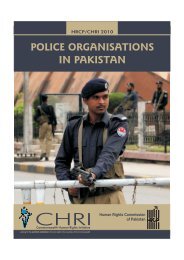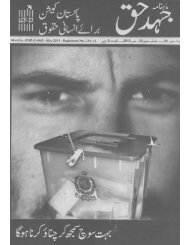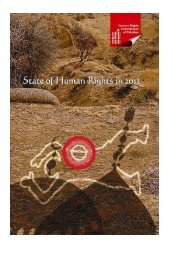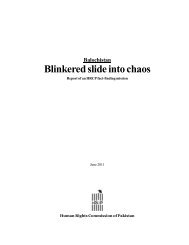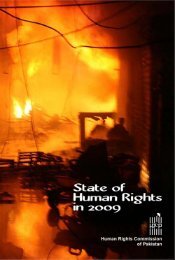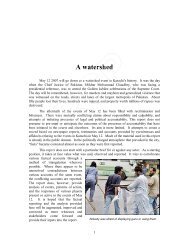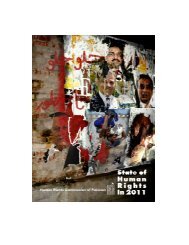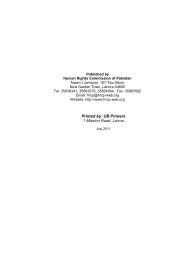Introduction 3executive. Third, the police areill-equipped and ill-trained tomeet the challenges posed byviolent insurgency(specifically), and ordinarycrimes and law and ordersituations (generally). Theirtraining needs are not given thepriority their job requires. 18YearTable 2:Complaints <strong>of</strong> Police inefficiency and highhandedness in Courts <strong>of</strong>Sessions, 2002-09 17HarassmentComplaint CategoryNon-registration <strong>of</strong>FIRAll these factorscontribute to make the policean ineffective and inefficientorganisation. However, anotherimportant reason why the2005200720082009142441322425,97031,6485646947386106,668139,5276136567811,70614,979police are unable to function asIncreasean effective and efficient 2002since 52 times 139 times 8 timesorganisation, accountable orresponsive to the public needs,Source: Annual Reports <strong>of</strong> the Lahore High Courtis the missing democratic legal framework that is crucial for any public service institution in a democracy.The Police Act, 1861, which held the field for 54 years after independence and was repealed by the existingPolice Order, 2002, was criticised, among other things, for being a law born out <strong>of</strong> colonial needs. It was alsocriticised for incorporating the principle <strong>of</strong> duality <strong>of</strong> control over the police (paragraph 2 <strong>of</strong> section 4 <strong>of</strong> the Act). 19Under this principle, the police <strong>of</strong>ficers were subject to the general control <strong>of</strong> the District Magistrate in certain areas<strong>of</strong> their functions especially those relating to their interaction with the public. However, there was no guarantee thatcontrol or superintendence was exercised to make the police function in accordance with law.The 1861 Act was further criticised for the ill-defined and vague relationship between the District Magistrateand the Police and its impact on the latter’s autonomy. 20 The Act vested superintendence <strong>of</strong> the police in the provincialgovernments. At the district level, it put the police under the command <strong>of</strong> the District Superintendent <strong>of</strong> Police, butsubject to the “general control and direction” <strong>of</strong> the District Magistrate, a bureaucrat belonging to the DistrictManagement Group <strong>of</strong> Civil Services. But neither the word “superintendence” nor the phrase “general control anddirection” was defined in law. This enabled the government <strong>of</strong> the day to use the police to serve the partisan interests<strong>of</strong> the regime in power, whenever required. 21However, at the same time, the magisterial controls were said to serve two important purposes namely: 22a. To provide an inexpensive and local police accountability mechanism; andHabeas Corpus2002 608 1003 19702003 8614 20301 55772004 13443 45943 5974b. To ensure availability <strong>of</strong> police for effective delivery <strong>of</strong> regulatory services by various governmentfunctionaries.The district magistrate provided a kind <strong>of</strong> barrier to the police excesses under the Police Act, 1861, whichwas removed by the Police Order, 2002, without providing an effective and efficient alternative. 23The <strong>of</strong>fices <strong>of</strong> the District Magistrate and other executive magistrates were abolished through amendmentsin the Code <strong>of</strong> Criminal Procedure, 1898. Amendments to the Police Act, 1861 in 2001 and later police reform underthe Police Order, 2002 accommodated the police views on duality <strong>of</strong> control. 24Under the Police Order, 2002 the superintendence <strong>of</strong> the police vested in the hands <strong>of</strong> the political executive,i.e. the provincial government, and the control <strong>of</strong> the District Magistrate over the police were supposed to beabolished to the advantage <strong>of</strong> the citizens. 25 However, the promulgation and implementation <strong>of</strong> the Police Order, 2002remained problematic right from the beginning.First, it was introduced as a federal legislation in the absence <strong>of</strong> democratically elected representative
4Revisiting Police Lawsinstitutions. Consequently, due consultation could never take place and consent <strong>of</strong> the provinces was never sought. 26The provinces generally did not own the new law and were not motivated to implement some <strong>of</strong> its essential features,such as the provisions prescribing public oversight <strong>of</strong> the police functions.Second, it was tagged with the local government project <strong>of</strong> the military regime <strong>of</strong> the time. This createdproblems as the local government project ran into severe resistance from the provincial governments that wereelected later that year. 27 Also, the provincial political executive resisted any idea <strong>of</strong> granting autonomy, howsoevernominal, to the police. Bowing to the pressure, amendments had to be introduced to the Police Order, which dilutedthe original intent <strong>of</strong> the legislation. As if depriving the provinces <strong>of</strong> the power to enact police related laws was notenough, the military ruler played another trick on the people by including the Police Order, 2002 in the constitutionallist <strong>of</strong> protected laws (under Sixth Schedule <strong>of</strong> the Constitution) which could not be altered or repealed by anyprovincial legislature without his prior permission. It is another matter that the unelected ruler did not hesitate toamend the law to suit the demands <strong>of</strong> his collaborators in the provinces.The reluctance <strong>of</strong> the political executive to accept the reforms propounded in the Order <strong>of</strong> 2002 led first tothe dilution <strong>of</strong> its original provisions and later to its tardy and half-hearted implementation. The Police Order haddiluted the powers <strong>of</strong> provincial governments to exercise control over the police by conferring powers on the ZilaNazim and by prescribing formation <strong>of</strong> District and Provincial Public Safety <strong>Commission</strong>s. The provincial governments,therefore, showed unwillingness to implement the reforms envisaged in the Order. The Federal Government couldnot resist the pressures and came out with an Amendment Ordinance known as the Police Order (Amendment)Ordinance, 2004, that restored some <strong>of</strong> the powers to control police forces to the provincial political executive. 28The Amendment Ordinance was re-promulgated innumerable times. However, it was never passed by theParliament. It was promulgated as the Police Order (Amendment) Ordinance, 2007 by the Musharraf-led governmentin July 2007 and was given protection under the Provisional (Constitution) Order, 2007. The Ordinance lost itsvalidity after the Supreme Court in its famous judgment <strong>of</strong> 31 July 2009, directed all the ordinances protected underthe Provisional (Constitution) Order, 2007, to be laid before the Parliament for validation. The ordinance was laidbefore the National Assembly as a bill in November, 2009; however, it never passed through the stage <strong>of</strong> considerationby the National Assembly’s Standing Committee on the Interior. 29 This has created a serious legal confusion andvacuum. This shows the priority and the level <strong>of</strong> importance attached to issues <strong>of</strong> policing in the highest politicalechelons <strong>of</strong> this country.Third, mechanisms <strong>of</strong> public oversight and accountability provided in the new law were resisted by thebureaucracy within the police and without. The Police Order, 2002 provided two mechanisms for police oversightand accountability. The first pertained to the superintendence powers <strong>of</strong> the government that related to oversight atthe institutional level. 30 The second set <strong>of</strong> mechanisms related to public oversight <strong>of</strong> police through the Zila Nazim 31and the District Public Safety <strong>Commission</strong>s and Complaints Authorities. 32 The main domain <strong>of</strong> such institutions waspolice accountability at local level on a case-to-case basis.The Police Order <strong>of</strong> 2002 proposed the establishment <strong>of</strong> Public Safety <strong>Commission</strong>s at the federal, provincialand district levels. One <strong>of</strong> the important functions <strong>of</strong> the commissions at the provincial and district levels was to “takesteps to prevent the Police from engaging in any unlawful activity arising out <strong>of</strong> compliance with unlawful or malafide orders” 33 .Another important function <strong>of</strong> the <strong>Commission</strong>s was oversight <strong>of</strong> the police. The District Public Safety<strong>Commission</strong> comprising six elected (members <strong>of</strong> Zila Councils, national and provincial assemblies) and three nonelectedmembers was mainly responsible for: 34a. Disposal <strong>of</strong> complaints pertaining to incidents <strong>of</strong> police neglect, excess or failure or against a federallaw enforcement agency when acting in aid <strong>of</strong> civil power;b. Approval <strong>of</strong> local policing plan and while doing so ensuring that the policing priorities and allocation<strong>of</strong> police resources is in line with the citizen’s requirements. The <strong>Commission</strong>s are also required to monitor performanceagainst targets set in the policing plans;c. Preventing collusive relationship between Zila Nazim and the district police;d. Disposal <strong>of</strong> unclaimed properties taken in possession by the district police;



